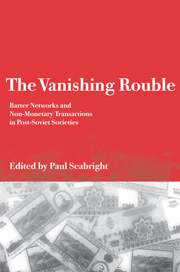Book contents
- Frontmatter
- Contents
- List of figures
- List of tables
- List of boxes
- Preface
- List of contributors
- Introduction: barter networks and ‘information islands’
- I Theory
- II Large-scale empirical studies
- 4 Barter in post-Soviet societies: what does it look like and why does it matter?
- 5 The growth of non-monetary transactions in Russia: causes and effects
- 6 Barter in Russia
- 7 The household in a non-monetary market economy
- 8 Barter in transition economies: competing explanations confront Ukrainian data
- 9 Barter and non-monetary transactions in transition economies: evidence from a cross-country survey
- III Ethnography
- Conclusion: what is to be done?
- Index
5 - The growth of non-monetary transactions in Russia: causes and effects
Published online by Cambridge University Press: 05 May 2010
- Frontmatter
- Contents
- List of figures
- List of tables
- List of boxes
- Preface
- List of contributors
- Introduction: barter networks and ‘information islands’
- I Theory
- II Large-scale empirical studies
- 4 Barter in post-Soviet societies: what does it look like and why does it matter?
- 5 The growth of non-monetary transactions in Russia: causes and effects
- 6 Barter in Russia
- 7 The household in a non-monetary market economy
- 8 Barter in transition economies: competing explanations confront Ukrainian data
- 9 Barter and non-monetary transactions in transition economies: evidence from a cross-country survey
- III Ethnography
- Conclusion: what is to be done?
- Index
Summary
Introduction
In Russia and the rest of former Soviet Union (FSU), recent years have seen possibly the largest departure from conventional monetary transacting since the end of the Second World War. The growth in non-monetary transactions such as barter has occurred alongside large-order accumulation of arrears in the economy. The arrears have not only been inter-firm but have also included government, utilities and workers. While the accumulation of arrears has occurred at various points throughout Russia's transition (most strikingly in 1992), since 1994 there has been a clear and continuous increase not only in the scale of non-payments but also in the use of non-monetary transactions. So the obvious questions that arise are: why, and how are these phenomena related?
While the available statistics are far from robust, recent time series estimates show large and steady increases in the share of barter in total industrial sales. The Russian Economic Barometer panel suggests that between the first quarter of 1995 and 1998 the share of barter in industrial sales jumped from under 20 to around 50 per cent. However, what has loosely been termed barter has actually lumped together a variety of transaction types, including money surrogates. Evidence from other parts of the former Soviet Union – such as Belarus and Ukraine also indicates large shares of barter, for both domestic and external trades.
- Type
- Chapter
- Information
- The Vanishing RoubleBarter Networks and Non-Monetary Transactions in Post-Soviet Societies, pp. 114 - 146Publisher: Cambridge University PressPrint publication year: 2000
- 18
- Cited by



